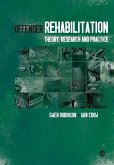Covering all the key topics across the subject of Penology, this book gives you the tools you need to delve deeper and critically examine issues relating to prisons and punishment.
The second edition:
explores prisons and punishment within national, international and comparative contexts, and draws upon contemporary case studies throughout to illustrate key themes and issues includes new sections on actuarial justice, proportionality, sentencing principles, persistent offending, rehabilitation, and abolitionist approaches to punishment features a
The book also includes a useful study skills section which guides you through essay writing and offers hints and tips on how you can get the most out of your lectures and seminars.
This is the perfect primer for all undergraduate students of Criminology taking modules on Prisons and Punishment or Penology.
The second edition:
explores prisons and punishment within national, international and comparative contexts, and draws upon contemporary case studies throughout to illustrate key themes and issues includes new sections on actuarial justice, proportionality, sentencing principles, persistent offending, rehabilitation, and abolitionist approaches to punishment features a
The book also includes a useful study skills section which guides you through essay writing and offers hints and tips on how you can get the most out of your lectures and seminars.
This is the perfect primer for all undergraduate students of Criminology taking modules on Prisons and Punishment or Penology.
The new edition of this popular undergraduate text will be widely welcomed. Clearly written and challenging, it addresses issues from the justifications for punishment to the ownership and operation of penal systems, especially prisons. It is an ideal introduction for those coming into the relatively new and contested discipline of criminology.
Professor Mick Ryan 20140131
Professor Mick Ryan 20140131









